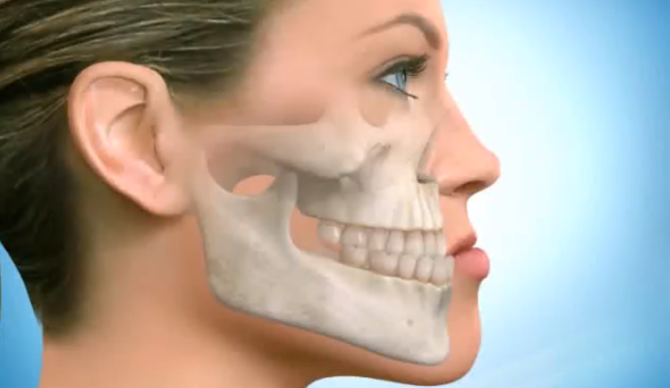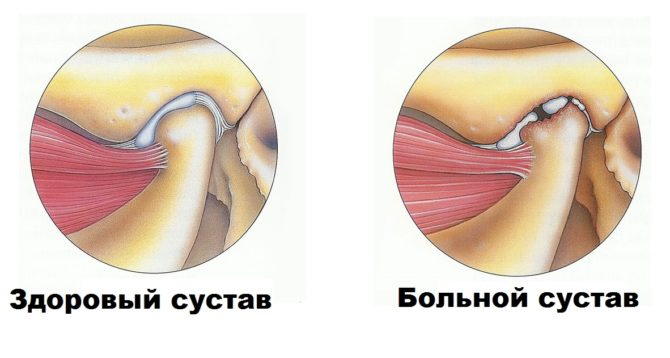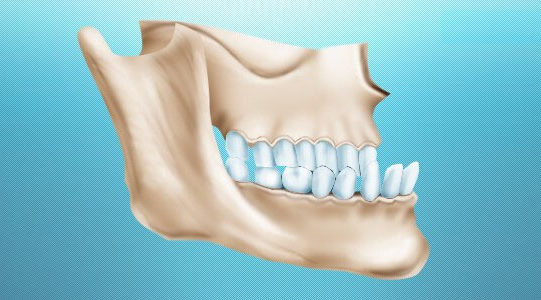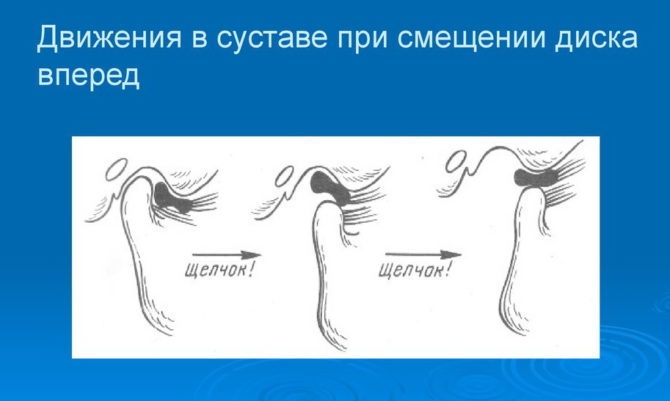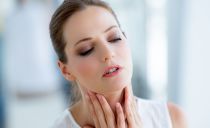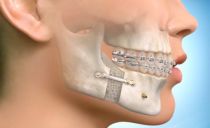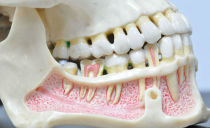The jaw clicks and crunches when you open your mouth and chew: reasons and what to do
If the jaw creaks and clicks when you open your mouth, then the first thing you do not need to do is to somehow adjust it yourself, since clicking can be associated with injuries of the mandibular joint. It is better to immediately consult a doctor so that he conducts the appropriate diagnosis.
Content
Reasons why the jaw clicks
A crunch in the jaw when chewing or talking is just a symptom that can indicate a variety of diseases. Most often, the following reasons are observed:
- Pathology of the mandibular joint:
- Dislocation, especially bilateral, when you open your mouth and can not close.
- Subluxation, in which there is joint fatigue due to a long stay with an open mouth.
- Arthrosis and arthritis after purulent forms of diseases of the oral cavity: tonsillitis, tuberculosis, gonorrhea.
- Inflammation on the right or left side of the temporomandibular joint.
- Cartilage wear.
- Any other dysfunction in which it becomes difficult to chew.
- Decreased muscle tone:
- Spasm of the jaw muscles on the right or left, for example, as a result of severe stress and overstrain.
- Trismus is an excessive muscle tension during daily activities.
- Dental problems:
- Multiple caries - dilapidated teeth violate the height of the bite and lead to its displacement, the jaw withstood the load for some time, and then cracked for the first time.
- Old or poorly fitted metal dentures.
- Mesial bite, jaw creaks before straightening.
- Poor filling without taking into account anatomical features.
- Extraction of wisdom teeth.
- Other issues:
- Involuntary gnashing of teeth - bruxism.
- Structural features of the jaw joints and ligaments.
- Connective tissue dysplasia.
- Tonsillitis.
- Diseases of the facial nerves, for example, trigeminal neuralgia.
- Any maxillofacial injury. Usually they are the general reason why the jaw clicks when opening and closing the mouth.
Clicking the jaw is often associated with the development of the body in adolescents, when the head of the joint is significantly smaller than the joint bag. In this case, treatment is not required, but traumatic situations should be avoided.
Jaw arthritis
This disease develops as a result of the pathogenic action of microbes. Because of their vital functions, the meniscus becomes thinner or swollen, tissue fibers become loose, and the articular head itself begins to fuse with cartilage. This is caused by the accumulation of a large amount of pus in the tissues due to complications of infectious diseases and inflammatory processes after injuries.
If a person’s jaw hurts and clicks even with slight movement, it is visually displaced and swollen, this may indicate developing arthritis. You should not wait for fever, hearing impairment due to the development of a purulent form and other serious symptoms, you must immediately visit an orthodontist or maxillofacial surgeon.
Mesial bite
Jaw problems can occur due to malocclusion when the lower jaw is pulled forward and the front lower teeth cover the upper row.Most often, the problem can be eliminated by installing braces, but all individually.
Neuralgia
Nerve damage often causes characteristic pain. There are neuralgia:
- The trigeminal nerve. The lesion is one-sided in nature, therefore, clicks and clicks the joint in the jaw only on the right or left side, pain sensations worsen at night.
- The pharyngeal nerve. Symptoms in the form of painful seizures with increased salivation, which intensifies when talking and eating.
- Upper laryngeal nerve. The pain is localized in the lower jaw, but can spread to the entire face or chest, and is activated during yawning, chewing, and blowing your nose.
Injuries
After mechanical damage, the jaw often knocks and crunches when opening the mouth. If these clicks are accompanied by pain, then its intensity is directly proportional to the severity of the injury. Distinguish the following damage:
- Soft tissue contusion without fracture of the bone. It is accompanied by edema near the affected area, bruising and acute pain.
- Fracture. Symptoms: impaired integrity, displacement of the jaw, swelling near the site of the impact and severe pain when closing the mouth.
- Dislocations. Most often, such injuries occur in patients with gout, arthritis, rheumatism. There are usual and sharp dislocations. The former arise due to problems with the activity of the articular apparatus, the latter must be treated with restriction of mobility due to orthodontic fixation.
Connective tissue dysplasia (DST)
Some of the diseases in which the jaw clicks have hereditary causes. DST is a pathology of the development of the connective tissue of the embryo and the baby, leading to a violation of homeostasis at all levels of the body, including the temporomandibular joints.
With the disease, an inferior bone frame is formed. But the facial muscles involved in chewing do not have development problems, and therefore they press with standard intensity, which leads to damage to the articular elements due to reduced strength properties.
Tonsillitis
Inflammatory processes, including in the vegetative form, in the glands and adenoids can be the reason why the jaw crunches. Characteristic sounds occur with greatly enlarged tonsils, when swallowing becomes difficult. The most effective in this case is tonsillectomy.
Symptoms
For all pathologies associated with the appearance of knocking when moving with jaws, almost the same symptoms are characteristic.
Jaw clicks
The clicks that occur when opening and closing the mouth can be classified. For example, depending on how many times the jaw crunches when chewing, they are single and multiple.
They are also divided according to sound intensity:
- Strong when crunching is heard by everyone around.
- Medium, when a person opens his mouth, and creaks are heard only to him.
- The weak. They arise at the very beginning of the pathological process, are not noticeable even to the patient himself. Often such a creak is confused with the usual sounds when chewing food.
Sometimes clicks from both sides are classified depending on the position of the lower jaw during clicking:
- with incomplete opening of the mouth;
- when the mouth opens to the middle;
- with a wide opening;
- when they start chewing food;
- when the jaw closes.
Additional symptoms
In addition to the characteristic clicking sound, headaches, difficulty in moving the jaws (amplitude limitation), tinnitus, swelling and redness of the site of inflammation, and discomfort during chewing food and talking, giving into the ear, may appear.
Sometimes the jaw not only knocks, it also wedges, and the submandibular lymph nodes increase. It is better to consult a doctor not after the occurrence of these symptoms, but at the very beginning, when clicks in the jaw when opening the mouth only began to appear.Initially, you can make an appointment with an ordinary dentist, and he will already refer the patient to an orthodontist or gnatologist, but not all clinics have the last specialist.
Treatment is carried out on the basis of diagnostic data, and it can only be carried out by a specialist. Self-medication at home without specifying a diagnosis (applying warm compresses, conducting therapeutic exercises) can lead to irreversible consequences, even death.
Diagnosis
Diagnosis of the exact causes of jaw clicking includes a number of measures:
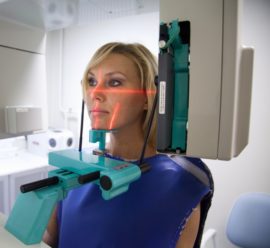 palpation on both sides of the temporomandibular joint;
palpation on both sides of the temporomandibular joint;- anatomical studies of the bite;
- neurological diagnosis, including trigeminal nerve;
- Ultrasound and X-ray of the area with pathology and tissues near it;
- general blood test, which is required to check for the absence of inflammatory diseases;
- facial electromyography;
- dental examination, even if no tooth hurts;
- MRI is prescribed in advanced cases and when no metal structures are installed in the patient’s oral cavity;
- collecting information about what the patient complains of when the jaw cracked for the first time.
What to do if the jaw crunches and clicks
Treatment is prescribed based on the diagnosis. In some cases, medication will not be required, but in others, urgent hospitalization will be indicated. In the presence of inflammatory processes, antibiotics are prescribed.
Drug treatment
The painful sensations that often accompany the jaw clicking can be eliminated with the help of analgesics, but only according to the doctor’s testimony:
- Ketanol
- Ibuprofen.
- Analgin.
The use of glucocorticosteroids is justified for the treatment of arthritis. They help to quickly stop the inflammatory process, suppressing the immune response. These drugs include:
- Prednisone.
- Hydrocortisone.
- Medrol.
To restore cartilage, various chondroprotectors are used, for example, Teraflex and Chondroitin.
Physiotherapy
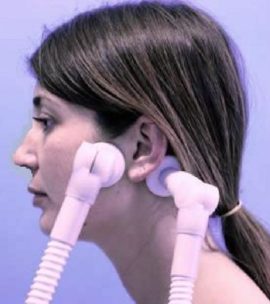 Physiotherapeutic procedures are classified as conservative methods of treatment. They help with muscular-articular dysfunctions and jaw diseases. The following methods of similar therapy are distinguished:
Physiotherapeutic procedures are classified as conservative methods of treatment. They help with muscular-articular dysfunctions and jaw diseases. The following methods of similar therapy are distinguished:
- Fluctuation in the masticatory muscles. It has an analgesic effect.
- Anti-inflammatory microwave radiation to the joint.
- Infrared laser magnetotherapy. It is relevant if the jaw already wedges, restores the acid-base balance.
- Electrophoresis with drugs, which helps to reduce the inflammatory process, improve tissue metabolism and blood supply. Of the drugs, novocaine or dimexide is most often used.
For the best effect, physiotherapy should be combined with massages, myogymnastics and psychotherapeutic trainings.
Surgery
In case of serious injuries and pathogenic formations, patients are shown surgery:
- Invasive The drug substance is injected into the joint under pressure with the help of two needles, due to which the leaching of harmful microorganisms and the healing of tissues occur.
- Arthroscopy Targeted removal of scars and adhesions through surgical punctures with a scalpel.
- Open operations. Replacing the inflamed parts of the joint is done through an incision in front of or behind the auricle.
- Joint head prosthetics.
- Retroaricular technique. Joint fixation with special internal screws.
Complications
If the jaw clicks only with a wide opening of the mouth, usually no one is in a hurry to see a doctor. However, if you do not pay attention to this symptom, serious complications may arise in the future:
- dislocation to the right or left and complete deformation of the affected joint on one or both sides;
- articular disc tear;
- thinning of tooth enamel due to increased load on it;
- the development of rheumatism;
- tooth loss;
- generalization of infection.
Prevention
To avoid serious problems with the jaws, preventive measures should be taken in advance:
- correct an abnormal bite;
- treat caries in the early stages of occurrence;
- establish fillings and prostheses taking into account anatomical features;
- chew food on both sides;
- timely treat inflammatory diseases of the oropharynx;
- avoid stressful situations.
If the jaw starts to click when chewing, you can not do anything yourself - you need to immediately contact the doctors. Dental pathologies are not treated independently at home.

